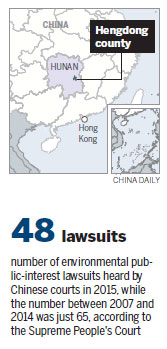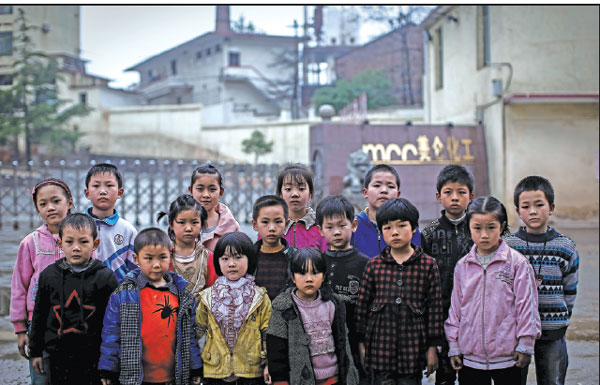Counting the cost of pollution
Updated: 2016-07-15 08:25
By Cao Yin and Zheng Jinran(China Daily)
|
|||||||||
Courts need more help to gauge compensation due to victims affected by environmental degradation, legal experts tell Cao Yin and Zheng Jinran.
Lawyer Dai Renhui won a major case when he represented 13 village children against the chemical pigment company accused of causing their excessive blood-lead levels. But he didn't feel like celebrating.
Despite a court in Hunan province finding in favor of his clients, just two of the children were actually awarded compensation, and the sums were far less than expected.
The families from Hengdong county had demanded just over 2 million yuan ($300,000) from Hengyang Meilun Chemical Pigment Co to cover their medical bills, but in the end the company was ordered to pay a total of 26,000 yuan.
"It wasn't even enough to cover the costs of bringing the lawsuit," Dai said.
After the initial judgment early last year, the families appealed to the municipal intermediate court but met with the same result. Some are now petitioning the provincial high court while others have given up.
"We have accepted materials relating to an appeal from one parent, but whether we retry it and when that would happen is still to be decided," said Li Yuxian, a spokesman for the high court.
Lawsuits brought by citizens against polluting companies have risen sharply in China, yet the Hunan case shows that courts lack guidelines on how to handle them and how to compensate those who win.
Dai, who works for the Center for Legal Assistance to Pollution Victims, said the children in Hengdong were all age 4 or 5 when they started to display symptoms of excessive blood-lead levels in 2014.
The families blamed emissions from Meilun Chemical for contaminating the soil and water supplies. The company's plant, which was just 30 meters from their village, was ordered to close in 2014.
Both courts heard that all 13 children had tested positive for excessive blood-lead levels. However, only two - identified as Yi and Huang - had readings of over 250 micrograms per liter, the threshold set by the national health authority to differentiate between high and severe. The judges ruled that only these two cases would receive compensation.
According to the national health authority, excessive levels of lead in the blood can cause long-term damage to a child's intellectual development, and nervous and digestive systems, and can lead to anemia and cardiovascular disease.
"In China, courts have no standard way of qualifying how much damage has been caused to a child's development (by pollution), so it's difficult for them to come up with a compensation figure," Dai said.
He said the independent teams that courts use to provide research or context on an issue (these can be university institutes or companies) are not allowed to advise on the link between pollution and health damage. This would need to be approved by the Supreme People's Court.
In the United States, courts take into consideration the short - and long-term effects on a plaintiff's studies, employment and relationships when deciding compensation, Dai added, "but in our country there is no such practice."
Wang Canfa, a law professor at the China University of Political Sciences and Law who works with the Center for Legal Assistance to Pollution Victims, said the lack of guidelines to determine what affect pollution has had on a person's health has led not only to low compensation payouts, but also some cases have been lost while others have not even made it to court.
Many professionals are unwilling to even do research on the link because such studies are lengthy and expensive, he added.
Wang Zhenyu, an attorney specializing in environmental disputes, represented a similar case to Dai's in the northwestern province of Gansu. He is not confident the compensation issue can be fixed soon and suggested local governments set up special funds to help people affected by pollution.
"We have many ways to solve disputes, not only lawsuits," he said. "We can take advantage of administrative measures to initially provide aid to victims."
On May 30, a group of experts with the Chinese Society For Environmental Sciences suggested guidelines for lawyers to follow to prove a link between pollution and a client's health complaint. The fundamentals were:
Confirm the type of pollutants and that environmental degradation has occurred
Find evidence that the pollution started before the client's health problem and that it is not an isolated case
Make sure the health complaint was not caused by an occupational hazard or is genetic
Wang Zhenyu welcomed the input from institutes and professional groups to help with environmental litigation, but he still has concerns.
NGOs have been encouraged to bring public-interest litigations against polluting companies since the revised Environmental Protection Law took effect in January last year. "The number of these cases is rapidly increasing, too, but the results haven't been good," he said. "Some disputes are still hard to file, and it's equally hard to get courts to identify the severity of the damage caused by pollution."
Chinese courts heard 48 environmental public-interest lawsuits in 2015, while the total number between 2007 and 2014 was just 65, according to the Supreme People's Court.
Solving environmental disputes in China still has a long way to go, "not only in terms of filing cases, but also in technical knowledge so that courts can qualify how much damage has been done", Wang Zhenyu added.
Contact the writers at caoyin@chinadaily.com.cn and zhengjinran@chinadaily.com.cn
|
Children who have excessive bloodlead levels stand in front of Hengyang Meilun Chemical Pigment Co in Hengdong county, Hunan province, in April 2014. Photo Graphs By Yang Yi / For China Daily |


(China Daily 07/15/2016 page6)
Today's Top News
May stuns political world by appointing Boris Johnson
Li calls Sino-Mongolia ties 'best ever'
Russian, Chinese officials discuss space cooperation
25 killed, 50 injured as trains collide in Italy
EU called on to fulfill WTO promises
Ruling inherently biased and unjust 'piece of paper'
Tribunal issues ill-founded award on South China Sea
Theresa May set to be UK's next PM after rival quits
Hot Topics
Lunar probe , China growth forecasts, Emission rules get tougher, China seen through 'colored lens', International board,
Editor's Picks

|

|

|

|

|

|








